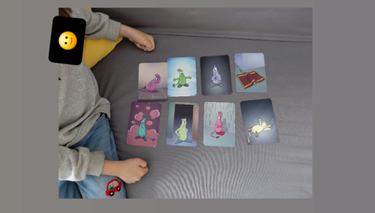Kim, a social worker providing individual support at a school, sent us the following report on her experience working with the Gefühlsmonster® cards:
“I used the Gefühlsmonster® cards as part of my individual case work at a primary school as a school social worker. The conversation took place with Mykola (name anonymised), a Ukrainian pupil who has been in Germany since first grade and is now in third grade.
Mykola came to my office regularly last school year because he often got into arguments with his classmates and had difficulty controlling his anger. At first, we talked about how he could better control his anger and what strategies could help him during our play sessions together.
When we used the Gefühlsmonster® cards for the first time, the conversation became much more intense. Mykola opened up more and addressed issues that had not been discussed before. I laid out several cards, and Mykola spontaneously chose a few to talk about his feelings. First, he described which card would suit which day of the week.
At the start of the new school year, Mykola reported mixed feelings: He chose cards 13 and 14 to express his excitement and, at the same time, his fear of starting school.

He also took card 11, which symbolised his anticipation of everyday school life. For Monday, he chose card 10 because he felt angry inside and expected arguments right at the start of the week. He described cards 1 and 6 as appropriate for Tuesday to Thursday, as he often feels unfairly treated, stressed and overwhelmed during this time – especially due to punishments and lots of homework. His statement was: ‘I don’t know where to start, there are so many tasks.’ In contrast, when looking at the weekend, there was a noticeable sense of relaxation. Mykola again chose card no. 11 and reported that he was happy and calm then, could sleep in, meet up with friends and did not experience any conflicts. He said that no one provoked him at the weekend or belittled him because of his German language skills (‘you’re bad and don’t speak German well’).
When we talked again about his conflicts at school, Mykola chose cards 7 and 16. He emphasised his impulsive handling of anger and that he quickly felt the need to lash out in minor arguments. The reason I sought out the conversation with Mykola was a past argument that had ended in a physical altercation. When I asked him how his parents reacted, he chose card no. 4 and reported that he had told his father everything and had to cry himself because the situation had affected him more than expected.
I was surprised that Mykola chose mostly sad and negative emotion cards, as he usually seems cheerful and popular to me in everyday school life. So I asked him when he felt comfortable and enjoyed going to school. He replied that he looked forward to school when there were special occasions to celebrate, such as Christmas, or when something nice was happening.
Together, we formulated a goal: Mykola would like to enjoy going to school again and experience less anger and conflict. We thought together about how he could achieve this and discussed that certain ‘trigger cards’ (e.g. nos. 1 and 10) should be reduced so that more positive feelings (e.g. cards nos. 6, 13, 14 and 21) could have more space. He said that it was very difficult for him to avoid arguments, even though he had been advised since nursery school to avoid conflicts (‘if you don’t allow arguments, nothing will happen’).
The use of the Gefühlsmonster® cards proved extremely helpful in getting Mykola to talk about his feelings. They enabled him to name and visualise emotions, which was a valuable aid given the existing language barrier.
Our sincere thanks to Kim for these valuable insights!